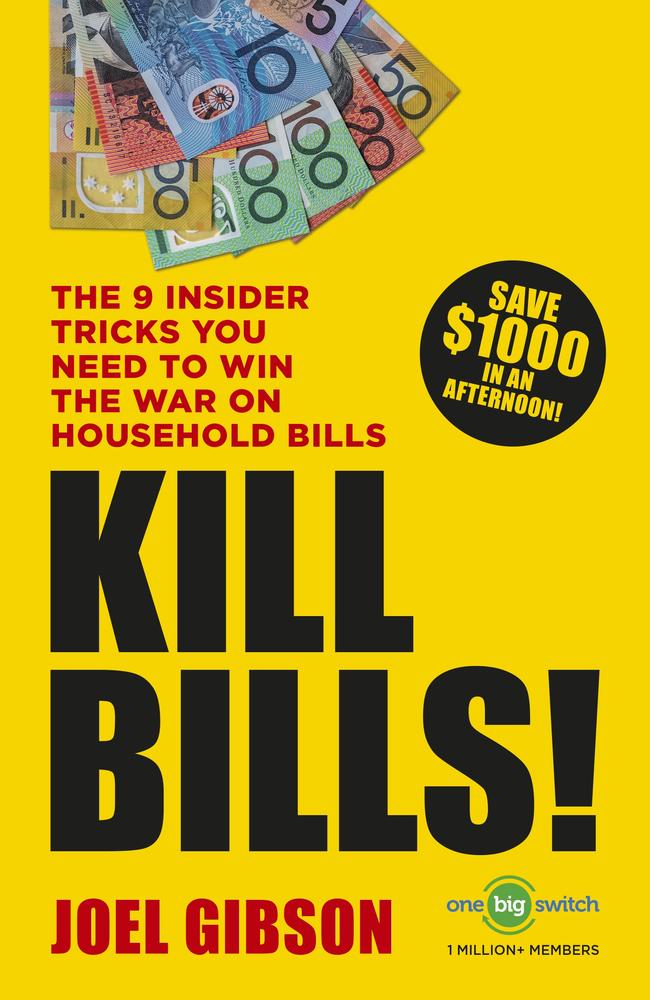Joel Gibson: Four insider tricks to save you a bucketload of cash on household bills
A few simple tricks based on insider intel can help you save a bucketload of cash on household bills. Finance expert Joel Gibson reveals what they are.
Business
Don't miss out on the headlines from Business. Followed categories will be added to My News.
- Six ways to slash costly bills and save $1000
- Ten ways to save money in 2020
- How to get your financial goals on track
To become a money-saving black belt, you need to master nine simple strategies.
They’re based on the inside info we’ve come across in eight years of saving Aussies money at the consumer network One Big Switch.
Here are the first four to get you started:
1) THE DE NIRO
I’ve named this trick after one of my favourite movies – the 1995 Michael Mann gangster flick Heat.
In Heat, Robert De Niro plays Neil McCauley, a professional thief who never gets caught because – just like a shark – he never stops moving.
The movie gets its name from his most famous piece of advice: Don’t let yourself get attached to anything you are not willing to walk out on in 30 seconds flat if you feel the heat around the corner.
That’s precisely the attitude you need to master if you’re determined to pay as little as possible for your bills.

If you’re not willing to walk away, if you’re not ruthlessly mobile, you’ll never get the best deals and sooner or later you’ll end up getting ripped off.
It puts you in a completely different class of customer – a group that businesses call the ‘Price-Chasers’.
Businesses know they have to work that little bit harder to win over the Price-Chasers – so they often do.
The essence of the ‘De Niro’ is leverage. (As Lord Nelson once said, ‘A fleet of British ships of war are the best negotiators in Europe.’) So before you can threaten to leave, you’ve got to have leverage – and the best leverage is to have in your hand a really good offer from another provider.
If your current provider can match it, you can stay.
If they can’t, or won’t match it, you can switch.
Either way, you win. If you’re not a confident haggler, no worries – there are scripts you can use in our book.
2) THE UNDER-THE-TABLE DEAL
Businesses are not bad; they’re more like robots, programmed to provide a service at the lowest cost and the highest margin possible. So they’ll mostly charge you whatever you’re prepared to pay. Most businesses have several offers:
A. Their base offer: For anyone silly enough to take it. This one makes them the most money, so they dangle it out there just in case.
B. Their on-market offer: For those who ask for something better, but don’t push them all the way.
C. Their under-the-table offer: For those customers they really need to work hard to keep.
How do you get the under-the-table offers? Once again, you need leverage, and there are a couple of ways to get yourself some of that.
You can threaten to leave, which often leads to your provider making you a so-called ‘retention offer’.
Some big businesses have whole teams who just work on ‘retention’.
When they hear you’re leaving, they will put you through to the ‘retention team’ or you’ll get a barrage of calls from them. Pick up the phone! That’s when you know you’re about to be made an offer that’s very, very hard to refuse!
But of course, it pays to have a Plan B before you make that threat.
So first, use brokers, comparison sites and buying groups like One Big Switch (where I work) to find an alternative offer that gives you leverage. There’s plenty of help out there.

3) THE MYSTERY SHOPPER
Some sophisticated companies employ teams of highly skilled actuaries to create algorithms that predict precisely how much they can increase your price be-fore you’ll leave them.
Research by the NSW Insurance Levy Monitor has found that existing customers who renew their home insurance pay on average 34 per cent more than new customers.
They also found that ‘quotes range from say $1000 to $2700 for the same house and contents from different providers.
That’s a big fat tax on loyal customers! But it creates a loophole for those in the know. How do you exploit this loophole? It’s time to don your disguise and go mystery-shopping!
HOW TO DO A MYSTERY SHOP
1. Put on some dark glasses and a fake moustache, Groucho Marx-style.
2. Go to your provider’s website.
3. Enter the details on your last renewal notice.
4. BUT don’t use the same name or address. This is because they might have yours stored already. Instead, use a different name (such as your partner’s) and a different address in the same postcode (such as your neighbour’s, where the risk profile of the suburb should be identical).
5. See what price they quote you. If it’s the same as your current price, you’re on a winner! Renew your policy and spend the rest of the day at the beach.
6. But if it’s radically lower than your own price, ask them to ‘please explain’! When faced with your research, most businesses will negotiate to keep you. If they don’t, maybe it’s time to get a quote from another website …
4) THE ELIZABETH TAYLOR
Entire industries such as energy and insurance have been built on what I call the ‘Honeymoon’ model. From a customer’s point of view it looks like this:
1. First, they give you a very cheap one-year offer to win you over (sometimes they’re even prepared to lose money on you in the first year if that’s what it takes).
2. Then, they quietly wind back your discount, or increase your rate or premium. And they take a punt that you’ll be too busy or too lazy or too afraid of change to dump them.
3. Finally, they make their money out of you in years two, three and four – unless you shop around annually.

Companies do this because it works: extensive testing and experience have shown it time and time again. Most of us don’t want to shop around or move providers every year. Who has time and energy for that, right?!
But that’s the insider trick here: the ‘Honeymoon Strategy’ of businesses actually creates a loophole for bill killers. If you’re prepared to move regularly, you can win and win again from this business model.
You can see where I’m going here.
The way to pay as little as possible for your power bills and a range of other bills too is to adopt the ‘Elizabeth Taylor’ approach and take honeymoon after honeymoon after honeymoon.
You can honeymoon with different providers and sometimes even with the same provider more than once (hello again, Richard Burton!).
And sometimes you don’t even have to leave to get a second honeymoon – when your plan goes up in the second year and you call the provider and say ‘Please explain’, they will often bring it back down and give you another ‘Price-Chaser’ deal to stay.
Joel Gibson is campaign director at One Big Switch. This is an edited extract from his book KILL BILLS! The 9 Insider Tricks You’ll Need To Win The War On Household Bills (Simon & Schuster).
RRP $20.
